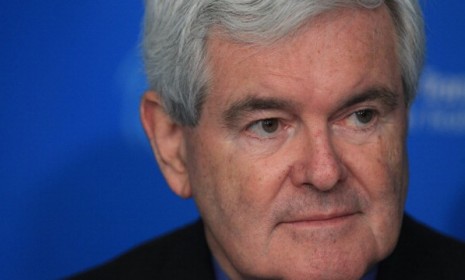Is Newt Gingrich becoming Glenn Beck?
Gingrich issues warnings about a Godless America "dominated by radical Islamists" — raising the question: What kind of conservative following is the 2012 hopeful courting?

A free daily email with the biggest news stories of the day – and the best features from TheWeek.com
You are now subscribed
Your newsletter sign-up was successful
As more Republicans inch toward entering the presidential race, Newt Gingrich is dialing up the rhetoric. The former House speaker warned at a Texas church meeting this week that if we're not careful, America will become a "secular atheist country, potentially ... dominated by radical Islamists." In a separate speech, Gingrich told the American Family Association that the country was being led by an "anti-Christian and anti-Jewish elite." This kind of talk, said one commentator, makes Gingrich sound like a "second-tier A.M. radio Glenn Beck wannabe." Is the 2012 presidential hopeful trying to woo the same conservative audience the Fox News favorite attracts?
The similarities are noteworthy: Gingrich is grasping for "huge, world-historical theories and systems," says Andrew Sullivan at The Atlantic. He is also "too emotional to separate his feelings from his thoughts," and he has an "absurd reputation for being an intellectual." Sound like anyone else you know?
The Week
Escape your echo chamber. Get the facts behind the news, plus analysis from multiple perspectives.

Sign up for The Week's Free Newsletters
From our morning news briefing to a weekly Good News Newsletter, get the best of The Week delivered directly to your inbox.
From our morning news briefing to a weekly Good News Newsletter, get the best of The Week delivered directly to your inbox.
Like Beck, Gingrich is just cynically playing to the crowd: "Can Gingrich really believe this?" asks Michael Crowley at TIME. More likely, this is merely his "showman impulse." Gingrich knows he can't win, and is using this presidential campaign as a "giant self-promotional opportunity" for his other business pursuits. Bashing Islam and atheism is "an easy sell" for the far-right fringe, as figures like Beck have discovered.
"Newt Gingrich and the Islamic radical states of America"
No, Gingrich has a unique strategy: The former Georgia congressman isn't just targeting atheists and Muslims, says Jonathan Turley at his blog. He's also going after academics, calling out college professors who, he says, are "secretly undermining Christian values." This trio of targets will become a "trifecta of hate" upon which Gingrich may just build a presidential platform.
"Gingrich: America in danger of becoming secular atheist country dominated by radical Islamists"
A free daily email with the biggest news stories of the day – and the best features from TheWeek.com
-
 Political cartoons for February 16
Political cartoons for February 16Cartoons Monday’s political cartoons include President's Day, a valentine from the Epstein files, and more
-
 Regent Hong Kong: a tranquil haven with a prime waterfront spot
Regent Hong Kong: a tranquil haven with a prime waterfront spotThe Week Recommends The trendy hotel recently underwent an extensive two-year revamp
-
 The problem with diagnosing profound autism
The problem with diagnosing profound autismThe Explainer Experts are reconsidering the idea of autism as a spectrum, which could impact diagnoses and policy making for the condition
-
 The billionaires’ wealth tax: a catastrophe for California?
The billionaires’ wealth tax: a catastrophe for California?Talking Point Peter Thiel and Larry Page preparing to change state residency
-
 Bari Weiss’ ‘60 Minutes’ scandal is about more than one report
Bari Weiss’ ‘60 Minutes’ scandal is about more than one reportIN THE SPOTLIGHT By blocking an approved segment on a controversial prison holding US deportees in El Salvador, the editor-in-chief of CBS News has become the main story
-
 Has Zohran Mamdani shown the Democrats how to win again?
Has Zohran Mamdani shown the Democrats how to win again?Today’s Big Question New York City mayoral election touted as victory for left-wing populists but moderate centrist wins elsewhere present more complex path for Democratic Party
-
 Millions turn out for anti-Trump ‘No Kings’ rallies
Millions turn out for anti-Trump ‘No Kings’ ralliesSpeed Read An estimated 7 million people participated, 2 million more than at the first ‘No Kings’ protest in June
-
 Ghislaine Maxwell: angling for a Trump pardon
Ghislaine Maxwell: angling for a Trump pardonTalking Point Convicted sex trafficker's testimony could shed new light on president's links to Jeffrey Epstein
-
 The last words and final moments of 40 presidents
The last words and final moments of 40 presidentsThe Explainer Some are eloquent quotes worthy of the holders of the highest office in the nation, and others... aren't
-
 The JFK files: the truth at last?
The JFK files: the truth at last?In The Spotlight More than 64,000 previously classified documents relating the 1963 assassination of John F. Kennedy have been released by the Trump administration
-
 'Seriously, not literally': how should the world take Donald Trump?
'Seriously, not literally': how should the world take Donald Trump?Today's big question White House rhetoric and reality look likely to become increasingly blurred